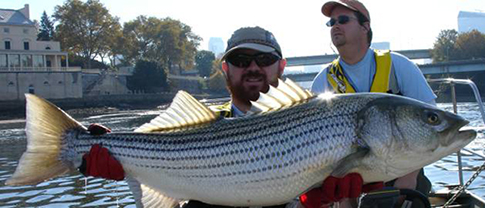
Joe Perillo and Lance Butler of Philadelphia Water with a monster striped bass. Credit: Philadelphia Water.
Earlier this summer the locally-produced Urban Wildlife Podcast sat down with our very own Joe Perillo to talk about what creatures lurk in Philly's waters. And if anyone knows, it's Joe.
After all, it's his job: Perillo is an aquatic biologist in Philadelphia Water's Bureau of Laboratory Services division who, along with fellow aquatic biologist Lance Butler, helped get our bio-monitoring program off the ground starting in 2001.
Aquatic bio-monitoring, the collection and study of things living in our watersheds, is a tool Philadelphia Water deploys to learn more about the health of our urban waterways.
Here's how Perillo described the value of bio-monitoring to Urban Wildlife, which is produced by reptile and amphibian enthusiast Billy Brown and West Philly birder and naturalist Tony Croasdale, who has helped tons of kids learn about nature in Cobbs Creek through his Wild West Philly docent program (supported by Philadelphia Water):
When you take a water sample, you're basically taking a snapshot. That's one second of what that water body is like. When you start looking at aquatic life like [algae] you're assimilating days' worth of information. When you move up to higher forms of life, such as invertebrates, their life cycle is months, so now you're taking in all that environmental information. When you go to fish, you're talking about years. So instead of just grabbing that one snapshot of that one second of what the water is like, by looking at the aquatic life, you're getting longer term pictures of the health of the rivers and, specifically, what's impacting the health: what's keeping it from being healthier, or being impaired or polluted. Is it stormwater? Is it sewer overflows? Is it habitat degradation, sedimentation?
We thought Perillo's Urban Wildlife chat was so good (topics such as drunken Philly alligators are covered), we decided to ask him a few questions of our own to learn a bit more about his bio-monitoring work, which involves everything from briefly stunning fish en masse with a cattle prod-like tool to collecting microscopic plant life.
Philly Watersheds: It seems like the public only sees and hears about what you guys are doing when you happen to come across a 40-inch striper and your picture ends up on Philly.com, but I assume your day-to-day work is a bit different than just electroshocking trophy bass. How much of the time are you out there collecting these living samples, and how much of the time are you studying the information you get from the samples?
Perillo: My work is strongly tied with the different seasons of the year and varying life cycles of diverse aquatic organisms. Some of the creatures we study (like shad) are only present in this region for a couple weeks in the entire year. I would say, in a general sense, that late winter through the spring and into early summer is the busiest time of year; I’m almost always in the field and hardly in the lab during this time period. My work moves indoors when ice starts to form on our waterways, so December, January, and February we are in the lab looking into microscopes, analyzing data, and writing reports.
PW: Does Philadelphia Water have labs where scientists study fish and other biological samples, or do you mainly send the samples out to another lab and then study the results when they come back?
Perillo: We work closely with state and federal scientiststo collect, analyze, and interpret results.
PW: What does Philadelphia Water do with the information it collects from aquatic life samples?
Perillo: Most information is related to State and Federal Permit Compliance requirements and ends up in comprehensive reports to the major environmental regulators. I have published some of our data in peer-reviewed scientific journals and presented research at international scientific conferences.
PW: In the years that you've been doing bio-monitoring in Philadelphia, have you observed any trends?
Perillo: A surprising trend for most folks is that in many instances water quality and biotic integrity is better in the city portion of a watershed than out in the suburbs.
PW: And, of course, what's the coolest aquatic life you've ever found in Philadelphia?
Perillo: Several years ago, was the first time in almost 200 years that an adult American Shad was found above Valley Forge in the Schuylkill River. At one time this species was the king of the river, shaping much of the cultural and economic history; but it was nearly wiped out during the Industrial Revolution due to severe pollution, over-harvesting, and construction of dams/loss of habitat.
To learn more about Perillo's work out on Philadelphia's rivers and hear some great stories about the natural world at your doorstep, listen to the full Urban Wildlife Podcast episode here (Joe comes in around the 9 minute mark). You can also read about our fish monitoring program (the source of those great striped bass pics) here.